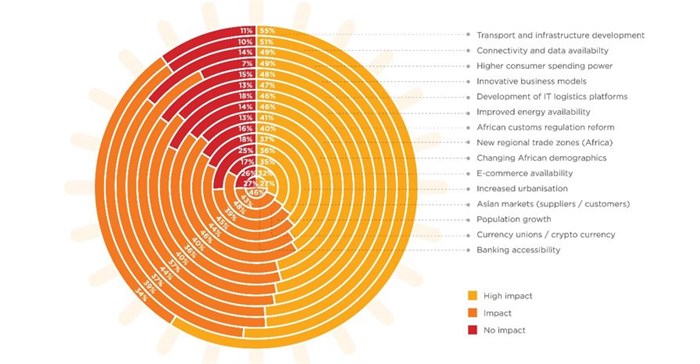South African businesses of all sizes and across sectors are having a torrid time - faced with global uncertainty, political flux, and ongoing technology-driven disruption, merely staying afloat as become a Herculean task. However, the results of the Barloworld Logistics 13th annual
supplychainforesight survey have revealed a stubbornly optimistic streak among local business leaders and decision-makers. Indeed, many are looking to capitalise on key opportunities and trends that have very clearly emerged from a complex and fast-moving business ecosystem.

Kate Stubbs
Arguably, one of the biggest opportunities lies in an organisation’s ability to not only navigate change but to foresee key trends and thus outmaneuver competitors. This capability, however, does not come about through sheer luck or talent – it is something that savvy leaders are beginning to institutionalise and embed in the very fabric of their business operations.
Institutionalised adaptation - abandoning the traditional approach
An example of this type of ‘institutionalised adaptation’ can be found in General Electric, which has been very openly abandoning its traditional ‘Global 2000’ approach, and behaving more like a nimble Silicon Valley startup. By implementing a company-wide programme labeled FastWorks, GE is essentially embedding lean startup practices into its operations. Most notably, this involves moving away from strict approval processes to instead allow employees to make seamless changes to their projects, as well as change strategies and direction very quickly and autonomously.
Testament to how seriously the company has been taking the adoption of new business practices, it enlisted tech pioneer and author Eric Ries to help develop the FastWorks programme, based in part on his global bestseller, The Lean Startup. As explained in the 2011 book, Ries’s philosophy is designed to help companies foster innovation and bolster product development by building imperfect early versions, releasing them to customers, soliciting feedback, and then pivoting or adapting the products when required.
Translating ideas into action
As we move into a period of higher market disruption and greater economic and political uncertainty in South Africa, it is critical for local companies to replicate this type of experimentation and forward-thinking. Interestingly, our most recent survey indicated that businesses have identified key opportunities – but the question remains as to how committed they are to pursuing them and translating them into tangible strategies.
The survey revealed that transport and infrastructure ranked the highest in terms of an opportunity to impact growth both significantly and positively. This opportunity affects almost every sector of business enterprise in South Africa, although it requires major investment in order to move the dial. Infrastructure development is not just related to transport but to power, water, telecommunications, social structures and support facilities.
Unsurprisingly, technology-related elements rank highly as opportunities spanning data and connectivity issues, IT platforms and e-commerce - all of which will benefit from higher consumer spending power. Each of these perceived needs creates opportunities across almost every segment of commerce and industry. The overall response to the perception of future opportunities points to a high level of enthusiasm and excitement of 69%, while 24% expressed their concern, indicating varying levels of optimism.
Without a doubt, those companies that can turn this optimism into real ideas, and duly transform ideas into cleverly designed strategies will achieve future success. As the tough global market reality becomes ever more apparent, it is evident that the only way to truly harness change is to view change as the biggest business opportunity in and of itself.




































